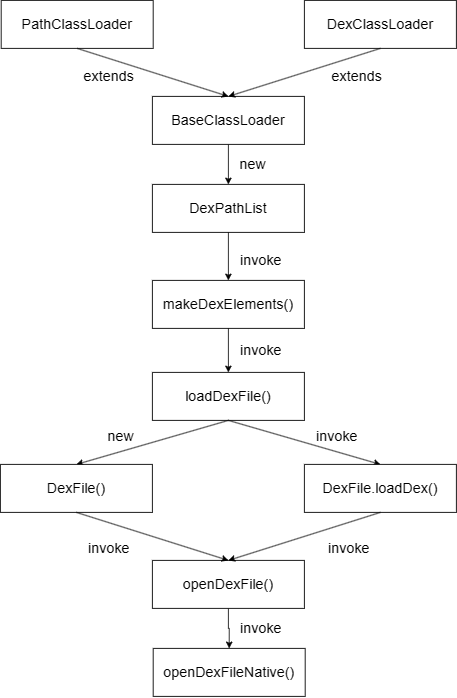有关类的加载在andriod_system_opreation_process篇
Android中的ClassLoader类型分为系统ClassLoader和自定义ClassLoader。其中系统ClassLoader包括3种是BootClassLoader、DexClassLoader、PathClassLoader
Android Code Search 安卓源码搜索网址 本文以15.0.0_r3为例分析
PathClassLoader 用于系统和app的类加载器,其中optimizedDirectory为null
PathClassLoader 是作为应用程序的系统类加载器,也是在 Zygote 进程启动的时候初始化的,它通常用于加载 已经安装的apk 里面的 .dex 文件。
(基本流程为:ZygoteInit.main() -> ZygoteInit.forkSystemServer() -> ZygoteInit.handleSystemServerProcess() -> ZygoteInit.createPathClassLoader()。在预加载基本类之后执行),所以每一个 APP 进程从 Zygote 中 fork 出来之后都自动携带了一个 PathClassLoader。
1 2 3 4 5 6 7 8 9 10 11 12 public class PathClassLoader extends BaseDexClassLoader { public PathClassLoader (String dexPath, ClassLoader parent) { super (dexPath, null , null , parent); } public PathClassLoader (String dexPath, String librarySearchPath, ClassLoader parent) { super (dexPath, null , librarySearchPath, parent); } }
DexClassLoader 从包含classes.dex的jar或者apk中,加载类的类加载器, 可用于执行动态加载, 但必须是app私有可写目录来缓存odex文件. 能够加载系统没有安装的apk或者jar文件, 因此很多热修复和插件化方案都是采用DexClassLoader
1 2 3 4 5 6 7 8 9 public class DexClassLoader extends BaseDexClassLoader { public DexClassLoader (String dexPath, String optimizedDirectory, String librarySearchPath, ClassLoader parent) { super (dexPath, null , librarySearchPath, parent); } }
DexClassLoader提供了optimizedDirectory,而PathClassLoader则没有,optimizedDirectory用来存放odex文件的地方,所以可以利用DexClassLoader实现动态加载
BaseDexClassLoader BaseDexClassLoader会初始化dexPathList,收集dex文件和Native文件动态库
1 2 3 4 5 6 7 8 9 10 public BaseDexClassLoader (String dexPath, File optimizedDirectory, String librarySearchPath, ClassLoader parent) { super (parent); this .pathList = new DexPathList (this , dexPath, librarySearchPath, null ); if (reporter != null ) { reporter.report(this .pathList.getDexPaths()); } }
dexPath: 包含目标类或资源的apk/jar列表;当有多个路径则采用:分割;
DexPathList() 主要负责管理和解析类加载器中涉及的 DEX 文件路径、优化后的 ODEX 文件、以及本地库(Native Libraries)的搜索路径
1 2 3 4 5 6 7 8 9 10 11 12 13 14 15 16 17 18 19 20 21 22 23 24 25 26 27 28 29 30 31 32 public final class DexPathList { private Element[] dexElements; private final List<File> nativeLibraryDirectories; private final List<File> systemNativeLibraryDirectories; public DexPathList (ClassLoader definingContext, String dexPath, String librarySearchPath, File optimizedDirectory,boolean isTrusted) { ...... this .definingContext = definingContext; ArrayList<IOException> suppressedExceptions = new ArrayList <IOException>(); this .dexElements = makeDexElements(splitDexPath(dexPath), optimizedDirectory, suppressedExceptions, definingContext, isTrusted); this .nativeLibraryDirectories = splitPaths(librarySearchPath, false ); this .systemNativeLibraryDirectories = splitPaths(System.getProperty("java.library.path" ), true ); List<File> allNativeLibraryDirectories = new ArrayList <>(nativeLibraryDirectories); allNativeLibraryDirectories.addAll(systemNativeLibraryDirectories); this .nativeLibraryPathElements = makePathElements(allNativeLibraryDirectories); if (suppressedExceptions.size() > 0 ) { this .dexElementsSuppressedExceptions = suppressedExceptions.toArray(new IOException [suppressedExceptions.size()]); } else { dexElementsSuppressedExceptions = null ; } } } }
makeDexElements makeDexElements方法的作用是获取一个包含dex文件的元素集合
1 2 3 4 5 6 7 8 9 10 11 12 13 14 15 16 17 18 19 20 21 22 23 24 25 26 27 28 29 30 31 32 33 34 35 36 37 38 39 40 41 42 43 44 45 46 47 48 49 50 51 52 53 54 private static Element[] makePathElements(List<File> files, File optimizedDirectory, List<IOException> suppressedExceptions) { return makeDexElements(files, optimizedDirectory, suppressedExceptions, null ); } private static Element[] makeDexElements(List<File> files, File optimizedDirectory, List<IOException> suppressedExceptions, ClassLoader loader) { return makeDexElements(files, optimizedDirectory, suppressedExceptions, loader, false ); } private static Element[] makeDexElements(List<File> files, File optimizedDirectory, List<IOException> suppressedExceptions, ClassLoader loader, boolean isTrusted) { Element[] elements = new Element [files.size()]; int elementsPos = 0 ; for (File file : files) { if (file.isDirectory()) { elements[elementsPos++] = new Element (file); } else if (file.isFile()) { String name = file.getName(); if (name.endsWith(DEX_SUFFIX)) { try { DexFile dex = loadDexFile(file, optimizedDirectory, loader, elements); if (dex != null ) { elements[elementsPos++] = new Element (dex, null ); } } catch (IOException suppressed) { System.logE("Unable to load dex file: " + file, suppressed); suppressedExceptions.add(suppressed); } } else { DexFile dex = null ; try { dex = loadDexFile(file, optimizedDirectory, loader, elements); } catch (IOException suppressed) { suppressedExceptions.add(suppressed); } if (dex == null ) { elements[elementsPos++] = new Element (file); } else { elements[elementsPos++] = new Element (dex, file); } } } else { System.logW("ClassLoader referenced unknown path: " + file); } } if (elementsPos != elements.length) { elements = Arrays.copyOf(elements, elementsPos); } return elements; }
loadDexFile() 加载DexFile文件,而且会把优化后的dex文件缓存到对应目录
1 2 3 4 5 6 7 8 9 10 private static DexFile loadDexFile (File file, File optimizedDirectory, ClassLoader loader, Element[] elements) throws IOException { if (optimizedDirectory == null ) { return new DexFile (file, loader, elements); } else { String optimizedPath = optimizedPathFor(file, optimizedDirectory); return DexFile.loadDex(file.getPath(), optimizedPath, 0 , loader, elements); } }
DexFile() 用来描述Dex文件,Dex的加载以及Class的查找都是由该类调用它的native方法完成的
1 2 3 4 5 6 7 8 9 10 11 12 13 DexFile(File file, ClassLoader loader, DexPathList.Element[] elements) throws IOException { this (file.getPath(), loader, elements); } DexFile(String fileName, ClassLoader loader, DexPathList.Element[] elements) throws IOException { mCookie = openDexFile(fileName, null , 0 , loader, elements); mInternalCookie = mCookie; mFileName = fileName; }
DexFile.loadDex() 加载DexFile文件,而且会把优化后的dex文件缓存到对应目录
1 2 3 4 5 6 7 8 9 10 11 12 13 14 15 static DexFile loadDex (String sourcePathName, String outputPathName, int flags, ClassLoader loader, DexPathList.Element[] elements) throws IOException { return new DexFile (sourcePathName, outputPathName, flags, loader, elements); } private DexFile (String sourceName, String outputName, int flags, ClassLoader loader, DexPathList.Element[] elements) throws IOException { ...... mCookie = openDexFile(sourceName, outputName, flags, loader, elements); mInternalCookie = mCookie; mFileName = sourceName; }
openDexFile() 1 2 3 4 5 6 7 8 9 10 11 12 private static Object openDexFile (String sourceName, String outputName, int flags, ClassLoader loader, DexPathList.Element[] elements) throws IOException { return openDexFileNative(new File (sourceName).getAbsolutePath(), (outputName == null ) ? null : new File (outputName).getAbsolutePath(), flags, loader, elements); }
sourceName为PathClassLoader构造函数传递的dexPath中以分隔符划分之后的文件名;
openDexFileNative() 1 2 3 4 5 6 7 8 9 10 11 12 13 14 15 16 17 18 19 20 21 22 23 24 25 26 27 28 29 30 31 32 33 34 35 36 37 38 39 40 static jobject DexFile_openDexFileNative (JNIEnv* env, jclass, jstring javaSourceName, jstring javaOutputName ATTRIBUTE_UNUSED, jint flags ATTRIBUTE_UNUSED, jobject class_loader, jobjectArray dex_elements) { ScopedUtfChars sourceName (env, javaSourceName) ; if (sourceName.c_str() == nullptr) { return 0 ; } Runtime* const runtime = Runtime::Current(); ClassLinker* linker = runtime->GetClassLinker(); std::vector<std::unique_ptr<const DexFile>> dex_files; std::vector<std::string> error_msgs; const OatFile* oat_file = nullptr; dex_files = runtime->GetOatFileManager().OpenDexFilesFromOat(sourceName.c_str(), class_loader, dex_elements, &oat_file, &error_msgs); if (!dex_files.empty()) { jlongArray array = ConvertDexFilesToJavaArray(env, oat_file, dex_files); if (array == nullptr) { ScopedObjectAccess soa (env) ; for (auto& dex_file : dex_files) { if (linker->IsDexFileRegistered(soa.Self(), *dex_file)) { dex_file.release(); } } } return array; } else { ...... } }
OpenDexFilesFromOat 它的主要作用是解析 OAT 文件并提取出嵌入的 DEX 文件,为后续的类加载过程服务
1 2 3 4 5 6 7 8 9 10 11 12 13 14 15 16 17 18 19 20 21 22 23 24 25 26 27 28 29 30 31 32 33 34 35 36 37 38 39 40 41 42 43 44 45 46 47 48 49 50 51 52 53 54 55 56 57 58 59 60 61 62 63 64 65 66 67 68 69 70 71 72 73 74 75 76 77 78 79 80 81 82 std::vector<std::unique_ptr<const DexFile>> OatFileManager::OpenDexFilesFromOat( const char * dex_location, jobject class_loader, jobjectArray dex_elements, const OatFile** out_oat_file, std::vector<std::string>* error_msgs) { ScopedTrace trace (StringPrintf("%s(%s)" , __FUNCTION__, dex_location) ); CHECK(dex_location != nullptr); CHECK(error_msgs != nullptr); std::vector<std::unique_ptr<const DexFile>> dex_files; std::unique_ptr<ClassLoaderContext> context ( ClassLoaderContext::CreateContextForClassLoader(class_loader, dex_elements) ); if (class_loader == nullptr) { LOG(WARNING) << "Opening an oat file without a class loader. " << "Are you using the deprecated DexFile APIs?" ; } else if (context != nullptr) { auto oat_file_assistant = std::make_unique<OatFileAssistant>(dex_location, kRuntimeISA, context.get(), runtime->GetOatFilesExecutable(), only_use_system_oat_files_); ... std::unique_ptr<const OatFile> oat_file(oat_file_assistant->GetBestOatFile().release()); VLOG(oat) << "OatFileAssistant(" << dex_location << ").GetBestOatFile()=" << (oat_file != nullptr ? oat_file->GetLocation() : "" ) << " (executable=" << (oat_file != nullptr ? oat_file->IsExecutable() : false ) << ")" ; ... if (!added_image_space) { DCHECK(dex_files.empty()); ... if (oat_file != nullptr) { dex_files = oat_file_assistant->LoadDexFiles(*oat_file.get(), dex_location); ... } } if (dex_files.empty()) { ScopedTrace failed_to_open_dex_files ("FailedToOpenDexFilesFromOat" ) ; error_msgs->push_back("Failed to open dex files from " + odex_location); } else if (should_madvise) { } } if (oat_file != nullptr) { VLOG(class_linker) << "Registering " << oat_file->GetLocation(); *out_oat_file = RegisterOatFile(std::move(oat_file)); } } else { ... } } if (dex_files.empty()) { std::string error_msg; static constexpr bool kVerifyChecksum = true ; ArtDexFileLoader dex_file_loader (dex_location) ; if (!dex_file_loader.Open(Runtime::Current()->IsVerificationEnabled(), kVerifyChecksum, &error_msg, &dex_files)) { ScopedTrace fail_to_open_dex_from_apk ("FailedToOpenDexFilesFromApk" ) ; LOG(WARNING) << error_msg; error_msgs->push_back("Failed to open dex files from " + std::string(dex_location) + " because: " + error_msg); } } ... return dex_files; }
LoadDexFiles() 1 2 3 4 5 6 7 8 9 10 11 12 13 14 15 16 17 18 19 20 21 22 23 24 25 26 27 28 29 30 31 32 33 34 35 36 37 38 39 40 bool OatFileAssistant::LoadDexFiles(const OatFile& oat_file, const std::string& dex_location, std::vector<std::unique_ptr<const DexFile>>* out_dex_files) { std::string error_msg; const OatDexFile* oat_dex_file = oat_file.GetOatDexFile(dex_location.c_str(), &error_msg); if (oat_dex_file == nullptr) { LOG(WARNING) << error_msg; return false ; } std::unique_ptr<const DexFile> dex_file = oat_dex_file->OpenDexFile(&error_msg); if (dex_file.get() == nullptr) { LOG(WARNING) << "Failed to open dex file from oat dex file: " << error_msg; return false ; } out_dex_files->push_back(std::move(dex_file)); for (size_t i = 1 ;; i++) { std::string multidex_dex_location = DexFileLoader::GetMultiDexLocation(i, dex_location.c_str()); oat_dex_file = oat_file.GetOatDexFile(multidex_dex_location.c_str()); if (oat_dex_file == nullptr) { break ; } dex_file = oat_dex_file->OpenDexFile(&error_msg); if (dex_file.get() == nullptr) { LOG(WARNING) << "Failed to open dex file from oat dex file: " << error_msg; return false ; } out_dex_files->push_back(std::move(dex_file)); } return true ; }
GetOatDexFile() 1 2 3 4 5 6 7 8 9 10 11 12 13 14 15 16 17 18 19 20 21 22 23 24 25 26 27 28 29 30 31 32 33 34 35 36 37 38 39 40 41 42 43 44 45 46 const OatDexFile* OatFile::GetOatDexFile(const char * dex_location, std::string* error_msg) const { const OatDexFile* oat_dex_file = nullptr; std::string_view key (dex_location) ; auto primary_it = oat_dex_files_.find(key); if (primary_it != oat_dex_files_.end()) { oat_dex_file = primary_it->second; DCHECK(oat_dex_file != nullptr); } else { MutexLock mu (Thread::Current() , secondary_lookup_lock_); auto secondary_lb = secondary_oat_dex_files_.lower_bound(key); if (secondary_lb != secondary_oat_dex_files_.end() && key == secondary_lb->first) { oat_dex_file = secondary_lb->second; } else { std::string dex_canonical_location = DexFileLoader::GetDexCanonicalLocation(dex_location); if (dex_canonical_location != dex_location) { std::string_view canonical_key (dex_canonical_location) ; auto canonical_it = oat_dex_files_.find(canonical_key); if (canonical_it != oat_dex_files_.end()) { oat_dex_file = canonical_it->second; } } string_cache_.emplace_back(key.data(), key.length()); std::string_view key_copy (string_cache_.back() ); secondary_oat_dex_files_.PutBefore(secondary_lb, key_copy, oat_dex_file); } } if (oat_dex_file == nullptr) { if (error_msg != nullptr) { std::string dex_canonical_location = DexFileLoader::GetDexCanonicalLocation(dex_location); *error_msg = "Failed to find OatDexFile for DexFile " + std::string(dex_location) + " (canonical path " + dex_canonical_location + ") in OatFile " + GetLocation(); } return nullptr; } return oat_dex_file; }
OatDexFile::OpenDexFile 1 2 3 4 5 6 7 8 9 10 11 12 13 std::unique_ptr<const DexFile> OatDexFile::OpenDexFile(std::string* error_msg) const { ScopedTrace trace (__PRETTY_FUNCTION__) ; static constexpr bool kVerify = false ; static constexpr bool kVerifyChecksum = false ; ArtDexFileLoader dex_file_loader (dex_file_container_, dex_file_location_) ; return dex_file_loader.OpenOne(dex_file_pointer_ - dex_file_container_->Begin(), dex_file_location_checksum_, this , kVerify, kVerifyChecksum, error_msg); }
dex_file_loader.OpenOne 1 2 3 4 5 6 7 8 9 10 11 12 13 14 15 16 17 18 19 20 21 22 23 24 25 26 27 28 29 30 31 std::unique_ptr<const DexFile> DexFileLoader::OpenOne(size_t header_offset, uint32_t location_checksum, const OatDexFile* oat_dex_file, bool verify, bool verify_checksum, std::string* error_msg) { DEXFILE_SCOPED_TRACE(std::string("Open dex file " ) + location_); uint32_t magic; if (!InitAndReadMagic(header_offset, &magic, error_msg) || !MapRootContainer(error_msg)) { DCHECK(!error_msg->empty()); return {}; } DCHECK(root_container_ != nullptr); DCHECK_LE(header_offset, root_container_->Size()); std::unique_ptr<const DexFile> dex_file = OpenCommon(root_container_, root_container_->Begin() + header_offset, root_container_->Size() - header_offset, location_, location_checksum, oat_dex_file, verify, verify_checksum, error_msg, nullptr); return dex_file; }
DexFileLoader::OpenCommon 1 2 3 4 5 6 7 8 9 10 11 12 13 14 15 16 17 18 19 20 21 22 23 24 25 26 27 28 29 30 31 32 33 34 35 36 37 38 39 40 41 42 43 44 45 46 47 48 49 50 51 52 53 54 55 56 57 58 59 60 std::unique_ptr<DexFile> DexFileLoader::OpenCommon(std::shared_ptr<DexFileContainer> container, const uint8_t* base, size_t app_compat_size, const std::string& location, std::optional<uint32_t> location_checksum, const OatDexFile* oat_dex_file, bool verify, bool verify_checksum, std::string* error_msg, DexFileLoaderErrorCode* error_code ) { if (container == nullptr) { container = std::make_shared<MemoryDexFileContainer>(base, app_compat_size); } CHECK_GE(base, container->Begin()); CHECK_LE(base, container->End()); const size_t size = container->End() - base; if (error_code != nullptr) { *error_code = DexFileLoaderErrorCode::kDexFileError; } std::unique_ptr<DexFile> dex_file; auto header = reinterpret_cast<const DexFile::Header*>(base); if (size >= sizeof(StandardDexFile::Header) && StandardDexFile::IsMagicValid(base)) { uint32_t checksum = location_checksum.value_or(header->checksum_); dex_file.reset(new StandardDexFile (base, location, checksum, oat_dex_file, container)); } else if (size >= sizeof(CompactDexFile::Header) && CompactDexFile::IsMagicValid(base)) { uint32_t checksum = location_checksum.value_or(header->checksum_); dex_file.reset(new CompactDexFile (base, location, checksum, oat_dex_file, container)); } else { *error_msg = StringPrintf("Invalid or truncated dex file '%s'" , location.c_str()); } if (dex_file == nullptr) { *error_msg = StringPrintf("Failed to open dex file '%s': %s" , location.c_str(), error_msg->c_str()); return nullptr; } if (!dex_file->Init(error_msg)) { dex_file.reset(); return nullptr; } if (verify && !dex_file->IsCompactDexFile()) { DEXFILE_SCOPED_TRACE(std::string("Verify dex file " ) + location); if (!dex::Verify(dex_file.get(), location.c_str(), verify_checksum, error_msg)) { if (error_code != nullptr) { *error_code = DexFileLoaderErrorCode::kVerifyError; } return nullptr; } } if (error_code != nullptr) { *error_code = DexFileLoaderErrorCode::kNoError; } return dex_file; }






